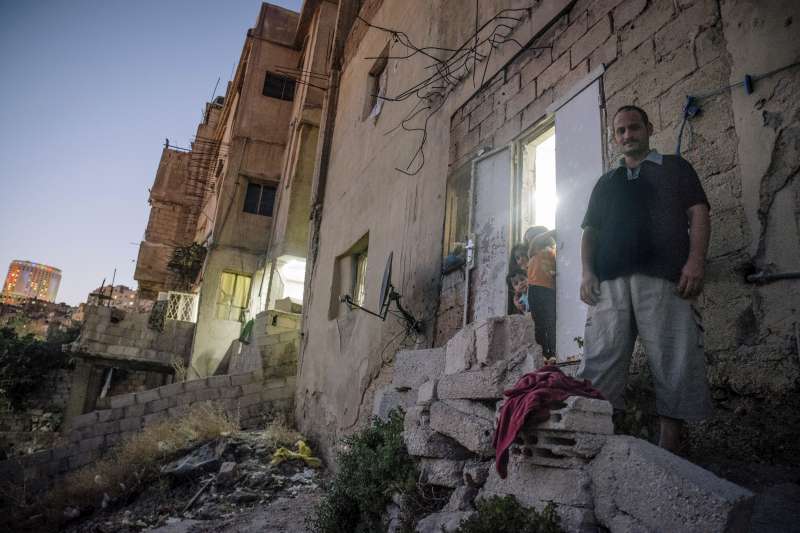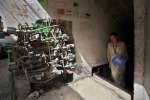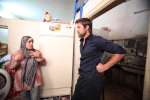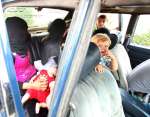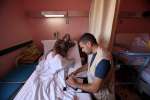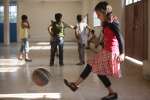- Text size
 |
|  |
|  |
| 
- Français
Hope gone in Jordan, Syrian refugees eye risky onward journey
News Stories, 14 December 2015
AMMAN, Jordan, Dec 14 (UNHCR) – Escaping three years ago from the shelling that flattened much of his hometown in western Syria, Omar* fled to Jordan with his wife and settled in the capital Amman.
He found a survival job working as a chef in a local restaurant, but later was reported for working illegally. Now jobless, the 31-year-old refugee is unable to cover the basic needs of his wife and their two-year-old son.
"I feel so desperate and helpless. If my wife or child gets sick here, I can't even afford to take them to the hospital. Imagine how it feels not being able to take care of your family. We have no other choice but to leave," said Omar, who has been repeatedly evicted from accommodation in recent months.
Unable to go home, and facing increasingly desperate living conditions in Jordan, he is among many Syrian refugees planning to set out for Europe in the coming months, despite an uncertain welcome and the deadly threat posed by winter temperatures and rough seas.
Of 950,000 refugees and migrants who have arrived in Europe this year alone, the highest share is escaping the nearly five-year-old conflict in Syria. While the majority left Syria during 2015, refugees are also leaving countries of first asylum such as Lebanon, Turkey and Jordan, ground down by years of hardship and losing hope that things will improve.
UNHCR spoke to several Syrian refugees facing bare need in urban areas of Jordan who have resolved to make the journey to Europe via Turkey this winter, despite the obvious dangers. So far this year some 3,600 people have died while crossing the Mediterranean Sea.
Among the reasons they gave for leaving were: decreasing levels of humanitarian support, limited education opportunities and future prospects for their children, and the absence of legal employment making the most basic survival increasingly difficult.
Fearing for his son's safety, Omar would prefer to wait for the calmer seas of spring before attempting the crossing. But having convinced friends to lend them the US$4,000 they estimate they will need for the trip, he is determined to leave by March at the latest.
Even others scraping by have begun to lose hope. Samira*, 36, and her husband came to Amman two years ago with their five children from Deir ez-Zor, currently a battleground bitterly fought over by combatants.
A former agricultural engineer with a Master's degree, her husband was only able to find factory work in Jordan. Having reached what she called "his personal breaking point", he made the long trip to Germany alone this summer to try and secure a future for them all.
Their plan was to apply for family reunion and follow him through official channels, but fearing that the process could take many months or even years, Samira has decided she and the children must now take the less certain but faster sea route. Worried that it will soon be too cold to travel, she plans to leave before the end of the year.
"My eldest son is finishing high school soon, and I want him to go to university. If we stay here he will end up working in the market, and I couldn't bear that. If our kids were younger, maybe we could have held out for longer, but they are reaching a critical age that will decide their future," she said.
For 37-year-old Ahmad, from Homs, the past four years as a refugee in the southern Jordanian city of Ma'an have seen a steady decline. "When we first arrived it was excellent, there was lots of assistance, rent was cheap and people were very kind. Now it's much harder. Rent and food has become so expensive," he said.
He has held out this long in the hope that he, his wife and their five-year-old triplets would be offered resettlement in the United States of America or Canada, but they are now making their own preparations to leave.
"The flights to Turkey will cost US$1,125. I have a list of 50 smugglers that I've contacted, and the cheapest is asking US$900 each for me and my wife – the kids go free."
Ahmad says if he could find legal work or the amount of assistance increased it might convince him to stay, but he can no longer wait on the off chance. "For Syrians it's just getting worse here. I don't mind where we end up – Germany, Sweden. As long as it's somewhere that guarantees my rights and my children's rights I don't mind, I'll go anywhere."
*Names have been changed for protection reasons.
By Charlie Dunmore in Amman, Jordan
